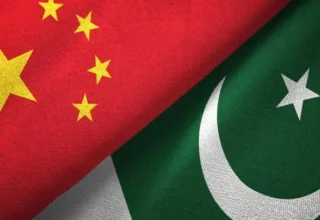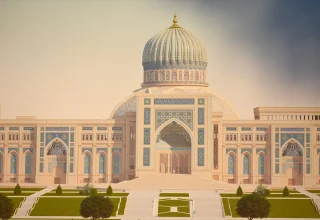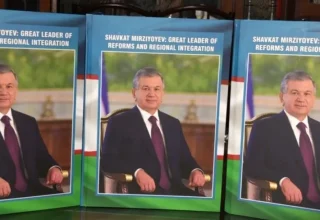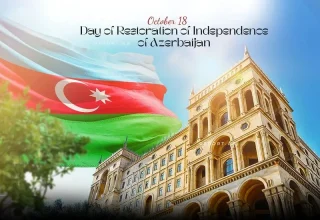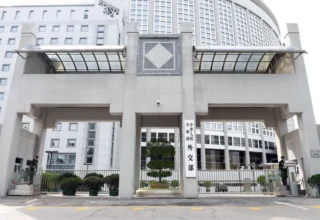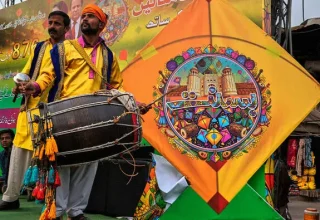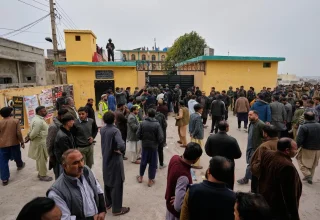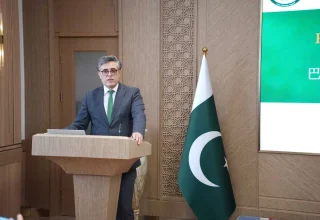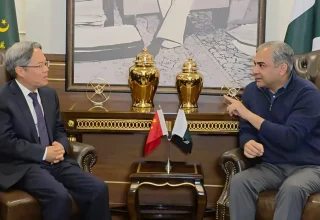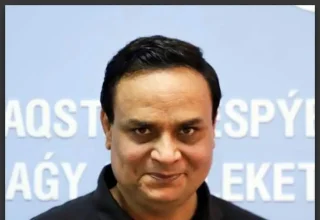
Once again true spirits of liberalized democracy are going to flourish in the upcoming presidential election in Indonesia. The biggest electoral battle will be fought on February 14, 2024.
In this regard, Indonesia will hold the world’s largest single day election to elect a president and vice president, along with nearly 20,000 representatives to national, provincial, and district parliaments from a pool of a quarter-million candidates. Undoubtedly, the people free will dominate at the judgment day of electioneering.
In this regard, Indonesia’s election commission (KPU) has announced the three candidates who will contest to succeed the incumbent President Joko Widodo as head of the world’s third-largest democracy in next year’s presidential election in February 2024.
Obviously elements of populism and realism have played an important role in the pairing of presidential candidacy process. Even old guards/kingmakers and troika are asserting their cards to form a winning combination in the elections 2024.
Political and electoral controversies have now been slowed down and Anies Baswedan & Muhaimin Iskandar, Ganjar Pranowo & Mahfud MD, Prabowo Subianto and Gibran Rakabuming Raka have been declared eligible as presidential and vice presidential candidate pairs for the simultaneous elections in 2024.
According to the KPU up to 205 million people will vote on February 14 for one of the candidates, confirmed after a series of eligibility and health screening checks. Judicial upheld highest level of electoral neutrality, political transparency and administrative accountability and succeeded to remove all misperceptions about the electoral process.
Interestingly, Gibran, the 36-year-old mayor of Surakarta city, was allowed to become Subianto’s running mate. Thus timely political maneuvering has further brightened the chances of winning the electoral titanic race in the upcoming president election 2024.
The official campaign period starts on November 28, but the presidential hopefuls have already embarked on nationwide tours seeking support from voters.
A survey released by Indikator Politik Indonesia, showed 39.7 percent of respondents would vote for third-time presidential contender Subianto, while 30 percent would back the governing party’s Ganjar Pranowo.
Critical analysis of the ongoing electoral process vividly reflects that the election is shaping up as a three-way race between Subianto and two former governors, Anies Baswedan and Ganjar Pranowo.
Baswedan, a former governor of Jakarta, chose as his running mate Muhaimin Iskandar, the chairman of the National Awakening Party, which has strong ties to the country’s largest Islamic organization, Nahdlatul Ulama, which boasts over 45 million members.
Pranowo picked Muhammad Mahfud, the minister of the Coordinating Politic, Law and Security as his running mate. Recent opinion surveys show Subianto maintaining a large lead over the rival camps.
All three, at different points of their careers, were either allies or foes of the president. Their stance on whether to continue with the construction of a new capital in Borneo the cornerstone of his legacy will feature in the election campaign.
According to critics Anies could use Islamic populism again. He’s chosen Muhaimin Iskandar, the leader of Indonesia’s largest Islamic party, as his vice president candidate clearly shows his intentions in this regard.
The Prabowo-Gibran coalition managed to gather a lot of political support compared to the other coalitions. It further consolidates Prabowo’s presidential ambitions, and sort of puts him on pole position in the race.
One of the interesting aspects of Indonesian political landscape is that its voters use to vote on the basis of character, image, and presented ideas, even if this person is not the presidential candidate of the voter’s preferred political party.
The theory of Realpolitik demonstrates that electoral race is being carried out among Islamic conservatives (Anies), Nationalist (Ganjar) Nationalists, the military and conservatives (Prabowo).It also shows rich ethnic diversity and political pragmatism in Indonesia progressive democracy.
The Anies-Muhaimin Iskandar reflects the historic union between modernist-conservative Islamic groups, as represented by Muhammadiyah, and traditionalist-orthodox Islamic voters exemplified by Nahdlatul Ulama (NU).
Frankly speaking it may gain a significant level of support in West Java, with its substantial voter base, and in Banten, the fifth-largest voting constituency. Additionally, South Sulawesi and regions in Sumatra, such as Aceh and West Sumatra, could be fertile ground for their brand and message. However, it anti-minority and anti-secularism may derail its political ambitious.
Ganjar-Mahfud must secure victories in East Kalimantan, North Sumatra, and North Sulawesi and regions with Christian majorities in eastern Indonesia. In many respects, this platform closely aligns with candidate Jokowi’s, as it was crafted by the same party, the PDI-P. The key will be whether Ganjar can sufficiently distinguish his platform from Widodo’s previous ones.
Prabowo would directly compete in Central and East Java against Ganjar. Additionally, Prabowo would aim to remain competitive in West Java and Banten, where Anies Baswedan is expected to be strong.
It seems that authoritarian-era elites have long been dominated the country’s democratic politics, but now these aging powerbrokers are tussling with a popular president who wants to lead a new generation of kingmakers.
Indonesia’s democracy is still dominated by political, business, and military leaders due to which spirits of liberalized democracy has been gradually transformed the country’s democratic outlook, business orientation and last but not least strength of a decent civil society.
It is crystal clear that Indonesian democratic journey has been swinging between the political notions of Insider which ultimately smashed by the incumbent president (Outsider). Afterwards the old kingmakers played their cards and transformed his presidency into Insider orientation again.
In summary, Indonesia’s political powerbrokers are trying to support their preferred candidates/combination for the next presidency.
The troika of politicians, military and elites has been playing an important role in every election. Thus political pedigree has its role to play even in the 2024 elections.
Interestingly, Subianto has achieved a sizeable lead with voters between seventeen and thirty-nine years of age who comprise more than 60 percent of eligible voters.
Subianto is competing against two younger rivals, both of whom are being fielded by his Suharto-era contemporaries. One is Anies Baswedan (fifty-four), the former governor of Jakarta. He is running on the promise of “change” but has been nominated by the National Democrat Party an influential member of Widodo’s governing coalition for the past ten years.
Subianto’s second rival is Ganjar Pranowo (fifty-four), the former governor of Central Java. He is well-liked for his youthful charm.
Somehow, the existing troika has given Indonesia’s democracy a predictable transition which will definitely change through democratic trends and tendencies.
The old elite are still in charge of picking the candidates, and following the long tradition of electable politics in the country.














